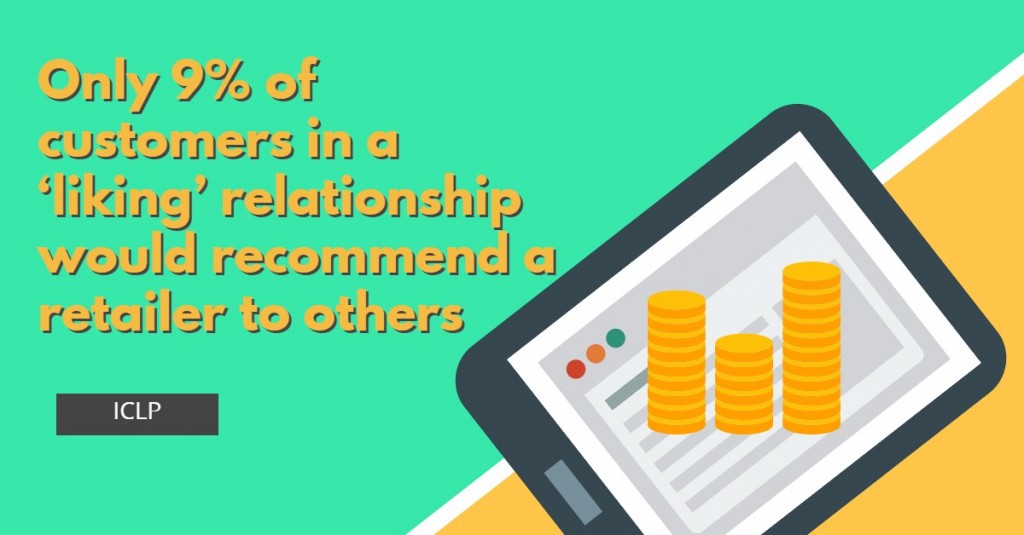Global loyalty marketing agency, ICLP, reveals that the majority of British consumers are now in less committed relationships with their favourite retailers than ever before, with only 8% feeling devoted towards their preferred retail brands.
Devotion, which is a factor of how passionate, committed and intimate consumers feel with a retailer, is key to growing high-value, enduring relationships between people and brands.
ICLP surveyed consumers in the UK to rate their experiences with friends and romantic partners, as well as brand relationships, on seven core relationship criteria. Those were recognition, rewards, reciprocity, reliability, respect, trust and communication. By partnering with a global authority on relationship dynamics, Professor Ron Rogge from the University of Rochester, the company was able to create a model that is based on Sternberg’s Triangular Theory of Love[i]. The theory focuses on three key components of a relationship: intimacy (willingness to share information with a retailer), passion (brand enthusiasm) and commitment (loyalty), which put into a retail context, allows brands to foster increasingly devoted relationships with customers.
The types of relationships analysed range from empty (the least desirable), liking, casual, romantic, companionate to devoted (the most desirable). In fact, the study found that at their most loyal, consumers fall into the devoted group and are enthusiastic, passionate and committed to a retailer. In addition, devoted customers are the most willing group of consumers to share personal information, opinions and desires with their favourite brands, and are least likely to stray to competitors.
The power of devotion
Devotion is the most favourable state for retail brands, as the study found that 91% of customers that fall into this group would recommend a brand they are devoted to. This is a major indicator of how valuable a devoted customer base is for word-of-mouth, compared with other types of customer relationships. Out of the other five relationship groups, levels of advocacy vary significantly. Only 9% of customers in a ‘liking’ relationship would recommend a retailer to others, 21% in a ‘casual’ relationship, and 37% in a ‘companionate’ relationship, revealing how powerful a devoted relationship is to a retailer’s bottom-line. Nonetheless, ‘romantic’ relationships which, according to Sternberg are characterised by high levels of passion and intimacy are also more inclined to share their love for certain retailers with 66% likely to recommend brands.
What retailers can do to create devoted customers
With only 8% of consumers currently falling into this valuable ‘Devoted’ consumer group, retailers need to find ways to drive this pinnacle relationship across their customer base. The research findings also provided valuable insight into how retailers can tackle the challenge of driving a deeper relationship with customers. The study found that consumer interest in loyalty programmes remains high in terms of encouraging spend, as 75% of shoppers stated they would be encouraged to shop more with a brand if it had a loyalty programme. The findings also suggest that loyalty goes significantly deeper than traditional points-based reward programmes. Retailers need to understand the key drivers that build more loyal relationships including ‘romantic’ relationships and that all-important ‘devoted’ relationship. These more loyal consumer groups shop more frequently, spend more and are better advocates for retail brands. To inspire more devoted customer relationships, retailers should:
- Foster brand advocacy: 91% of devoted customers would recommend a retailer to others, demonstrating the importance of creating and maintaining devoted customer relationships
- Create stronger rewards programmes: though consumers in empty, liking and casual relationships have lower expectations around rewards, 75% of UK consumers would buy more if they were better rewarded. This emphasises the power of using personalised rewards that ‘surprise and delight’ customers to move them towards a more devoted state
- Take time to understand customers’ needs: 63% would buy more if retailers used their data to understand their customers’ individual needs and requirements better. By doing this, retailers can encourage the intimacy required for a devoted relationship
- Build respect and trust amongst consumers: 54% would buy more if retailers treated them with more respect, and 51% would buy more if they trusted brands more. Trust is key to securing the commitment that exists where there is devotion
- Communication is also crucial: 51% would buy more if brands communicated with them better. This highlights the importance of using better communications and engagement strategies to create the reciprocal sense of passion present in a devoted relationship
Professor Ron Rogge, University of Rochester, commented: “ICLP’s recent study represents ground-breaking work in understanding the key components of brand loyalty. Our analyses suggested that the same seven basic types of relationships emerged for both brand and close relationships. In fact, a majority of respondents approached their relationships with favourite brands in a very similar manner to how they approached their close relationships.
Therefore, developing a strong and devoted relationship with a brand might not be so different from developing a strong and caring bond with another person, suggesting that people might buy with their hearts. This is exciting work, as it not only allows us to better understand and track the various types of brand loyalty, but it will also provide retailers with critical insights into targeting the needs and desires of specific classes of consumers in order to promote greater loyalty.”
 Jason De Winne, General Manager at ICLP, commented: “Brands today are finding it difficult to bond with their customers; the level of choice means consumers are increasingly distracted. Our research shows that what consumers need from a brand in order to build an emotional connection is very similar to what they require from relationships with friends and loved ones. That is, good communication, reliability, consistency, reward and recognition.”
Jason De Winne, General Manager at ICLP, commented: “Brands today are finding it difficult to bond with their customers; the level of choice means consumers are increasingly distracted. Our research shows that what consumers need from a brand in order to build an emotional connection is very similar to what they require from relationships with friends and loved ones. That is, good communication, reliability, consistency, reward and recognition.”
“Thinking about our own personal relationships, we know that people fall in and out of love and friendships – lured by ‘pastures greener’. Now we know that the same thinking can be applied to brand relationships which are dynamic and ever changing; if they weren’t then you would have pretty much a static number of customer’s year-in, year-out. But relationships are fickle and retailers looking to build and maintain devoted customer relationships should seek to truly understand what the emotional factors are that drive consumer loyalty.”


